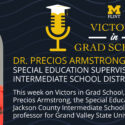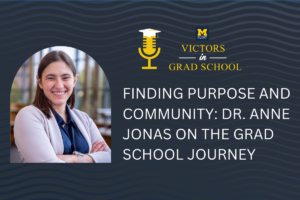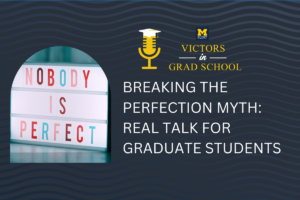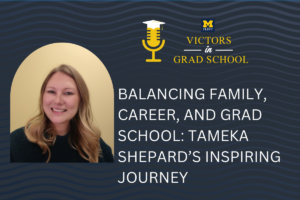On this episode of Victors in Grad School, we have a special guest, Dr. Precios Armstrong. Dr. Armstrong is the special education supervisor for the Jackson County Intermediate School District and an adjunct professor for Grand Valley State University. Dr. Christopher Lewis, the director of Graduate Programs at the University of Michigan, Flint, is excited to have Dr. Armstrong share her journey with us.
In this episode, Dr. Armstrong shares her career path, which initially started with a desire to go to law school but eventually led her to a career in education. She talks about the importance of continuous learning and how pursuing multiple degrees, including a master’s degree and an education specialist degree, has made her a better leader and servant leader. Dr. Armstrong also emphasizes the value of setting clear goals, sticking to a schedule, and building supportive networks for success in graduate education.
Dr. Lewis also shares his own educational journey, from a career in the nonprofit sector to becoming an educator. He discusses the importance of intentional choices, having a clear plan and timeline, and revisiting and aligning that plan with life circumstances. Dr. Lewis offers tips for successful graduate education, including brushing up on writing and research skills and pursuing one’s passion within the program.
Throughout the episode, both guests emphasize the value of mentorship, collaboration with colleagues, and the impact of their degrees on their careers. They encourage listeners to celebrate achievements and strive for continuous growth. Whether you’re a dad looking to support your daughter’s educational pursuits or a dad looking to further your own education, this episode of Victors in Grad School is packed with valuable insights and advice.
This podcast is brought to you by The Office of Graduate Programs at the University of Michigan-Flint. If you’re still wondering about other things to consider when it comes to graduate school, you can also contact the Office of Graduate Programs at UM-Flint. We’re here to answer questions Monday – Friday from 8:00 a.m. to 5:00 p.m. EST. You can also find out more about the 50+ programs that the university has to offer here.
TRANSCRIPTS
Christopher Lewis [00:00:01]:
Welcome to the Victors in Grad School, where we have conversations with students, alumni, and experts about what it takes to find success in graduate school. Welcome back to Victors in grad school. I’m your host, Dr. Christopher Lewis, Director of Graduate Programs at the University of Michigan, Flint. I’m really excited to have you back again this week. As always, I love being able to talk to you about the journey that you’re on. You may already be in grad school, you may just be thinking about grad school, maybe you’re toward the end of grad school, but you’re still going through that process. And this show is all about helping you to be able to walk through that process, to be able to give you some tips, some hints, some things that will help you to find success as you go through graduate school. And we do that every week by talking to other people because we have an opportunity every week to talk to different people, to learn from their experiences, the highs, the lows, and everything in between about what they learned about their own about what they learned about themselves and their own journey as they went through their own graduate school path. This week, we got another great guest with us. Dr. Precious Armstrong is with us today. And Dr. Armstrong is the special education supervisor for the Jackson County Intermediate School District, but she’s also an adjunct professor for Grand Valley State University. She’s actually going to be starting a new course here very soon, and I’m really excited to be able to bring her to you, and I’m looking forward to talking with her today to learn from her own journey and having her share that with you. Dr. Armstrong, thanks so much for being here today.
Precios Armstrong [00:01:52]:
Thank you. I’m excited to have this conversation.
Christopher Lewis [00:01:55]:
It is my pleasure having you here today. And I guess for me, I know that you did a couple of different undergraduate degrees. You got both of your bachelor’s degrees from Michigan State University. And at some point, after getting that first bachelor’s degree, because there was a little bit of time in between, you made the choice that you wanted to continue and get a second bachelor’s degree in leave behind Political Theory and Constitutional Democracy. And you went on and got a special education degree where you were able to then work with kids, with students, and then after that, you continued your education. So talk to me about what was going through your head as you were not only transitioning from one academic area to another bachelor’s degree area, but then what made you make that choice that you wanted to go further beyond those bachelor’s degrees themselves, to get then the master’s and beyond that, the specialist and the doctorate degree.
Precios Armstrong [00:03:02]:
So I always knew I wanted to work with students, but when I was going through the first degree, the goal then was to really go to law school and be an advocate in the legal realm for students in that way. And so I did all sorts of things in undergrad to prepare towards going to law school. And then when I got done, I didn’t want to go to law school. And so I went and got a job and went and worked for the state, worked for the Michigan Department of Civil Rights, transitioned from there, worked for Michigan Nonprofit Association. And it’s neat how people are putting spaces in places with you at the points along your journey that you’re supposed to encounter them. One of my colleagues at Michigan Nonprofit Association, she had gone to Notre Dame and got found out about a master’s program there. And so I used that as a way to explore what my next step was going to be because I knew I wanted to get to teaching. And so going the route of exploring program offerings that were available at Notre Dame, I said, you know, this isn’t exactly the right fit, so what makes more sense for me? And so going back to the drawing board, I started subbing. And when I was subbing, one of the principals pulled me aside and said, precious, I want you to go and sub in the special aid class. And I was like, I have no idea anything about special aid at all. She was like, that’s fine. Try it out for two weeks. If you don’t like it, you don’t have to stay there. But if you like it, I think you do a good job. And I fell in love with it. And because I fell in love with it, I knew I had to go back to school. I was like, okay. So we’ve shipped gears. We are no longer going to law school, but we’re absolutely going to become a teacher. And so I went back, and it made the most sense since my first bachelor’s was from Michigan State, it made the most sense to go back as far as credits were concerned. And so I went back and absolutely loved getting that second bachelor’s in special ed transition to working, being a fully employed teacher. And so while going through my first couple of years of teaching, I went ahead and finished up and did that master’s degree. Because again, recognizing that in my journey, being a perpetual learner, that not only benefits me, but it benefits the populations that I serve. And so that’s what got me to that space of going back and kind of will definitely shifting gears. I can say this, though. That first degree definitely, positively impacts the work that I do now, because in my current role, I have to understand policies. I have to understand the legality of things. And so those foundational pieces that I learned in that first degree have definitely carried me throughout.
Christopher Lewis [00:05:46]:
So you got those first couple of degrees at Michigan State University. Go green, go white. But then you made a decision to I’m going to say go to the other side, because I know people that attended Michigan State. They’re not always fans of the maze in blue. But you came over to the University of Michigan Flint to get your specialist and then on to your doctorate degree. There were a couple of years that went in between. Those that went between getting that first Master’s and then moving to the specialist made you choose to continue your education, and what made you choose to decide to attend the University of Michigan Flint for those degrees?
Precios Armstrong [00:06:29]:
So I always knew I wanted to ultimately become doctor. I knew that when I was in my first degree. However, after I finished my first graduate program, I said, I need a break, because at that point, I had been in school really most of my life. And so I said, I need a break. Let me see what it’s like to not be a student and to work. And so I spent from 2005, when I finished the Master’s, until 2016, I spent working. And I said, you know, let’s do that. But then it’s funny. One of my buddies that I met when I was working on my Master’s, who was also a special Ed practitioner, she was like, okay, so you ready? We talked about in the Master’s degree, about going ahead and getting the doctorate. Are you ready? And I was like, okay, I’m ready now. I can do this. And so the question was, where? And yes, it was an interesting decision to join U of M for that program, knowing I have spent all of my adult education prior to that with Michigan State. But it came down to even with my letter by my personal essay, I said, this Spartan wants to explore being a Wolverine as well. I will just be education divided. So that is how and when it came down to it, looking at the various different program offerings around the state, it made the most sense. U of M Flint Ed specialist was lights out, perfect for me. The format of it worked, the amount of time it was going to take work. It made sense. I was going to be able to not only advance certifications by adding the specialist central office certification, but also get the critical pieces I need within that curriculum realm. Because my Ed specialist, my concentration was curriculum instruction. And so it was a lot of pondering, but it made the most sense. And I had a fantastic experience with both the Ed specialist and the doctorate. I love how those marry each other. And that when I looked at U of M plant, the initial thought was, okay, so let’s just go right into the doctorate. But you can’t go into the doctorate unless you have the Ed specialist. So I said, Well, I can do that. I will absolutely do the Ed specialist and go on to the doctorate. I took a small break after the Ed specialist. But definitely it was an amazing experience with amazing people that I met in the cohorts that I was in people. As far as the professors were concerned. I always felt like I could talk to my professors. I always felt like the workload wasn’t crazy. It was the rigor that you should expect in a program as advanced as an Ed specialist and a doctorate program. However, it wasn’t one that felt like you were being beat down. I felt that at every point I could call a professor and say, okay.
Christopher Lewis [00:09:28]:
How did this go?
Precios Armstrong [00:09:29]:
Like, did this make sense? Was my writing clear? What can I do to be better? I always got great feedback, and really, I made the choice because I was old enough at that point in my journey and my maturation to be able to truly identify what I needed and what I wanted and how those converged and U of Influence program was the perfect fit for me.
Christopher Lewis [00:09:52]:
Now, through all of these different experiences, I can tell that you were motivated. You had the energy behind you. You had people, it sounds like, behind you to support you along the way, and you found success. As you look back at the experiences that you went through through those graduate degrees that you’ve received, and you think back to the transition that you had to go through with each of those different degrees, what did you have to do to set yourself up for success? And what did you have to do to maintain your success throughout all of those different degrees?
Precios Armstrong [00:10:25]:
I think every point I had to map it out, what did I need to do to get there and what was my end goal, and then celebrating each win. And so, especially with well, from bachelor’s to doctorate, I always had a list of what are the classes I need to do, what is needed for each one of those classes, and then checking it off so I would literally lay out at the start of a program, okay, what all do I need to do? All right, so then what is the timeline by which I want to get it done? Knowing that the timeline has always got to be flexible because life happens, and then making sure that within having that really kind of tentative but mapped out idea, creating a schedule for each class. So I’m in the class, what do I need to do, and what amount of time do I need to dedicate? And really sticking with that schedule. If you have a really good schedule, then what I found is that you have blocked off that time. It’s not a fly by night. This is my dedicated space so that when all the world goes crazy, I know I still have a schedule that I can rely upon to get to and making it one that if something goes wonky, that I couldn’t dedicate that time to writing, couldn’t dedicate that time to reading that day. I had time blocked off enough throughout my week that I could pick it up on another space, but it really was committing to a schedule of following through, but even more importantly, identifying like minded people to work with, both in the eds. Well, throughout my journey, I have been really afforded the opportunity to have almost a cohort model for the bachelor’s program that was within James Madison college, which is a residential program at Michigan state. So you come in all first year students and you really build up your cohort and you follow with everybody through. I followed that with building a network. When I came back to work on the second bachelor’s, with the masters and certainly with ed specialists, the folks in the ed specialists, we built groups within groups to say, okay, how are we doing? To the point of we even had a group meet that we formed. And then when I got to my doctorate, we created a dedicated study time every week that this is when we are going to study together, this is when we’re going to write together. So building those networks, being clear about what my goals were, setting a consistent schedule for how I would complete that work, those were the critical components that got me through.
Christopher Lewis [00:12:55]:
You mentioned at the very beginning of your answer that you had to map things out and that you had to do that for each degree that you went through. Can you walk me through what you did to map that out that helped you to be successful in those different degrees?
Precios Armstrong [00:13:12]:
I really looked at what did I need to get done, what did that course, what did that major require for me to get done? And if there was wiggle room, making very intentional choices about what I was going to gain the most out of, and where did my strengths, what was going to help build upon my strengths? I giggle often that for the bachelor’s, there’s a point in that sequence. In the first bachelor’s, there’s a point in the sequence where you had to choose between a logic course or a stats course. And I said, I’m going to pick logic. Now, in hindsight, I learned that that was really probably the harder choice, but it was intentional in what is going to help me move forward in a way that makes sense for me. And at every point when I got to the ed specialist, it was you have a whole sequence. You had an orientation, they mapped out what the courses were, and so I said, okay, so this is what the map says. Am I committing to this time frame, how this cohort goes, or am I going to need to take it a little bit slower? For me, it made sense to go ahead and go through in each point. Here is what I want to knock out. I literally had a posting in front of my desk at home that had, all right, what semester are we taking that class? And once I was done, I check it off, put what my final grade was, and say, okay, I’m scheduling the next one, and went forward with that. When I got to the doctorate, it was much the same way. And that, again, had it all mapped out, checked them off as I went. But then when I came to being a doctoral candidate so you’re in your phase of getting ready to write your dissertation. When I got to that phase, we mapped it out, like as a collective part of your defense, your proposal defense. You got to map out what your plan is. Well, we mapped it out and we stuck to it that this is what I need to get done and by when. And then again, relying upon that network at each point, all right, are we all doing this together? Here’s what we’re going to do. Knowing that everybody is not necessarily going to come along the same pace as you, because we all have our own journey. But even those who finish with you or those who don’t, still supporting one another in getting through and relying upon it can’t be just you. If you are just trying to go this alone, the road is so much harder. It is so important to build those networks, even if it is to just vent or share ideas to see does that make any sense? So that was what I did. It was very, write out what I need to get done, check it off as I go, and then making sure that I am revisiting that over and over again to make sure it makes sense and aligns with what was going on in my life at each step.
Christopher Lewis [00:15:54]:
You mentioned that your first bachelor’s degree really helped you in the work that you do, especially in regard to advocacy work that you do, and also understanding policy and looking at policy in different ways and how you advocate for students. As you look at all of these different degrees that you’ve had that you’ve built your career upon and you look back at each of them, how do you feel that those graduate degrees helped you? How do you feel that those degrees prepared you for the work that you do on a daily basis?
Precios Armstrong [00:16:30]:
They prepared me amazingly well when I look at my master’s degree. So much of what happens within schools is around behavior. And so being able to understand how we support behavior and what those best practices should look like and where those resources are has very much helped me as far as helping parents understand things, being collaborative with parents, collaborative and a source, and being a resource for teachers and principals, as well as having those conversations with students. And so that behavioral expertise that I gained there has been invaluable. Then you couple that with the Ed specialists where the focus was curriculum, instruction, being able to look at things from a 10,000 foot view and look at what that scope and sequence is how it is or is not. Meeting the needs of the populations that we serve has been invaluable as well, in and of itself, because I’m able to have those very intentional conversations from an educated standpoint of here’s what we should expect to get out, and how do we evaluate what those outcomes are in comparison to what our expectations were. And so being able to really look with a broad lens of how we’re utilizing curricular tools, how those align with the practices that are utilized, and being able to identify additional resources that are necessary has been phenomenal in being able to make sure that what we have for students and supporting parents makes the most sense. Then you couple that with my terminal degree and that opened up a whole other world for me of understanding research and understanding research to practice. And so I find that I am a much more, even more entrenched, evidence based, data based practitioner and coach. When I look at what my staff is doing, when I look at how I’m supporting families, I see that there is this other way of considering the information in ways that may be novel or they may be something that we typically use. But in either way, being able to look at it from a lens that says, okay, so can we prove that that works? Or are we just going from our gut because our gut is great, but is our gut supported by data? And so I found that all of those degrees have really helped me to be a better leader, a better servant leader, because there is a wealth of knowledge of both what can be done and how to reach out to resources and be open to the possibilities of other options that we may not have conceived of before.
Christopher Lewis [00:19:19]:
I think that with every degree that you go through, you take pieces of it and you fit them into the work that you do and they become a little more seamless as you go further into your career. So I appreciate you sharing all of that. Now, I mentioned you’re going to be an adjunct professor coming up at Grand Valley State University. You’re going to have your own graduate students that you are going to be working with, that you’re going to be teaching, that you’ll be mentoring, and they will look to you for guidance. I guess as you look back at your own graduate education, if you think about the students that you’re going to be working with and you think about your own journey that you went on, what are some tips that you might offer to students that are considering graduate education that will help them to find success?
Precios Armstrong [00:20:09]:
One, the first tip was brush up on your writing and your research skills because if you haven’t been in school lately. Those are the first things that make you question your existence, because definitely there is a different layer of expectation with your writing at the graduate level, let alone being able to really command what it is to do real research, that you are looking for peer reviewed articles. You are looking for well respected journals. Because I think because we have so much information at our fingertips, google is our friend, but Google is not our friend when we’re doing actual research. And so those will be my two biggest tips, making sure that they’re looking at those writings. If the writing is coming as more of a challenging piece, avail oneself of writing centers. Every college has them. U of M has a writing center. You can go and talk to the librarian. That was one of the great things I remember dr. Cheeram brought in. The librarian speak to us when we’re working on the Ed specialist, just to kind of make sure that we understood the level of expectation and how to be successful. So those would be my biggest things. But the other layer would be identify what your passion is. Identify what your passion is and utilize the program to further that passion. So that my passion is culturally responsive teaching and practices. And that’s why, ultimately, I did my dissertation on culturally responsive practices within special education classrooms. But in doing that dissertation, leading up to that, you can see that my writings within my Ed specialists were very much focused on my passion. So most of the assignments that were given, that was the lens I chose to utilize. And so that’s the piece. As a grad student, this is an opportunity to learn and grow. I look at grad professors as your colleagues to help elevate the way in which you conceive of your world. How can you utilize more resources and become and expand your expertise? And so in doing so, looking for ways in which that expansion is going to positively impact. And so that made the work more relevant for me, because it wasn’t work just to do the work. It was work that was going to translate into the practices of my everyday life.
Christopher Lewis [00:22:36]:
Well, Dr. Armstrong, I just want to say thank you. Thank you for being here today, for sharing your story, for showing that there are those pull strings that you have to follow, that you have to pull along with you, that you are going to be using along your path to help you along the journey that you’re on, to make it to the endpoint in your career that you want. And also that it sometimes takes a little bit of time to figure out what that is and to see it. Because when you’re in it, sometimes it’s not always easy to see. It doesn’t always make sense. But as you get further on, you definitely can look back and you can say, yeah, that’s what it is. That’s why I had to learn this. That’s how I’m going to use this. But sometimes it does take a little bit of time. But I truly want to say thank you. Thank you for sharing your journey today and I wish you all the best.
Precios Armstrong [00:23:32]:
Thank you.
Christopher Lewis [00:23:33]:
The University of Michigan Flint has a full array of master’s and doctorate programs. If you are interested in continuing your education, whether you’re looking for in person or online learning options, the University of Michigan Flint has programs that will meet your needs. For more information on any of our graduate programs, visit umflint.edu graduateprograms to find out more. Thanks again for spending time with me as you prepare to be a victor in grad school. I look forward to speaking with you again soon as we embark together on your graduate school journey. If you have any questions or want to reach out, email me at flintgradoffice at umflint.edu.





